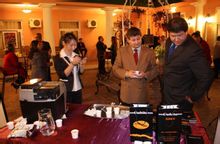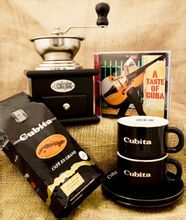Boutique Cuban coffee
In 1748, coffee was introduced into Cuba from Domiga, and Cuba began to grow coffee ever since. With fertile land, humid climate and abundant Rain Water, Cuba can be called a natural treasure land for coffee cultivation. The suitable natural conditions provide a favorable natural environment for the growth of coffee trees, and coffee is well planted and developed here. In Cuba, the cultivation of coffee is regulated by the state. The best coffee growing area in Cuba is located in the Central Mountains. Because this area not only grows coffee, but also produces quartz, crystal and other precious minerals, it is also known as Crystal Mountain. At present, Crystal Mountain Coffee is synonymous with top Cuban coffee.
In Cuba, most of the coffee beans are picked by hand. Coffee beans are picked about every half a month during the ripening period. During or after picking, coffee beans are classified and those immature and bad beans are removed to ensure the quality of the coffee. Cubans usually deal with coffee beans in two ways-tanning and washing. Tanning is the simplest, cheapest and most traditional way to treat coffee, which is to let the coffee fruit dry in the sun but not ferment. The general drying time is about four weeks. The washing rule makes the aroma of the fruit more into the coffee beans, thus adding a coarse fruit aroma to the coffee.
Cuba is like a crocodile crouching in the Caribbean, her tail brushing right on the Tropic of Cancer. Cubans have always been known for their enthusiasm, but they are also very sincere and stubborn. The same is true of their coffee, which has always been carried out in accordance with Arab coffee washing standards, and they have always followed their unique traditional methods to control the roasting process very extremely. it is necessary to have a very delicious, full-bodied and slippery coffee flavor, but also to keep the coffee beans from being overroasted and causing heat.
2 the most famous coffee: Cubita editor's original name: Cubita, Chinese name: amber coffee, origin: Crystal Mountain, Cuba

The 50th Anniversary of China-Cuba Friendship (2)
Cubita is Cuban coffee, which is mainly exported to Japan, France, Germany, Ireland, Canada and other countries. The cubita coffee entering the Chinese market is all selected from the pollution-free Crystal Mountain coffee beans in the high altitude areas of Cuba, which is a typical Caribbean coffee bean. All the particles of coffee beans are strictly selected according to the standard of sieve 17-19, and the selected coffee beans have large particles and high maturity. Cubita is all picked by hand, using water washing refining method to remove defective beans and other impurities to a large extent.
Cigars, coffee and sugar cane, as the three major industries of the Republic of Cuba, enjoy a high reputation in the world. Cuban cigar has a very high reputation in the world and is known as the first cigar in the world. Cuban coffee also has a high reputation in the coffee industry. Cuban Crystal Mountain Coffee ranks among the top several in the world. Crystal Mountain is adjacent to the Blue Mountain Mountains of Jamaica, with similar climatic conditions, which is comparable to Jamaican Blue Mountain Coffee. Similarly, the annual output of Cuban Crystal Mountain coffee is not high, so most of the time there is a price but no market. Cubita is an important economy and trade in which Cuba and China have established diplomatic relations to show friendship.
Cubita, the designated coffee of the Cuban Embassy, attended the celebration of the 50th anniversary of Sino-Cuban friendship.
The uniqueness

Unique characteristics of Cubita Coffee: nobility, tenderness and elegance
Cubita is produced in coffee from the pollution-free Crystal Mountain in the high altitude of Cuba, which is adjacent to the Blue Mountain Mountains of Jamaica and has similar climatic conditions, comparable to Jamaican Blue Mountain Coffee. Crystal Mountain is also known as the Blue Mountain of Cuba. As a result, there are many coffees under the banner of the Cuban Blue Mountains, but the purest Crystal Mountain Coffee Cubita is the top coffee allowed to use the Cuban "Crystal Mountain Coffee" and has become a coffee designated by the Cuban Embassy to drink it. At present, Crystal Mountain Coffee is synonymous with top Cuban coffee.
Cubita adheres to the principle of perfect coffee, only makes individual coffee, the picking of coffee beans is done by hand, and all the particles of coffee beans are strictly selected according to the standard of sieve 17-19, plus washing coffee beans, to a large extent, remove defective beans and other impurities to ensure the quality of coffee. It has a high reputation in the coffee industry. Careful people will find that Cubita is indescribably unique with other coffee. Cubita is not like Italian coffee, which tastes bitter and knight-like; unlike the arrogance of Blue Mountain Coffee, it feels like an emperor. But Cubita is like an elegant princess, with a sense of natural tenderness, nobility, tenderness and elegance. The balance is excellent, bitterness and acidity are well matched, and there will be a meticulous, smooth, refreshing and elegant feeling when tasting, which is the best enjoyment of coffee.
"she" is known as "unique Caribbean flavor coffee" and "special coffee bean among island coffee beans".
Important Notice :
前街咖啡 FrontStreet Coffee has moved to new addredd:
FrontStreet Coffee Address: 315,Donghua East Road,GuangZhou
Tel:020 38364473
- Prev

Organic coffee beans
In many parts of the world, growers use pesticides to control the growth of coffee pests, and moist and foggy coffee at high altitudes are more vulnerable to pests, so growers often use pesticides to treat them. Many people believe that coffee can be called organic coffee beans as long as synthetic pesticides, herbicides and chemical fertilizers are not used during coffee growth. in fact, only in third parties (except coffee makers and coffee makers).
- Next

Tell me about Brazilian coffee.
Brazilian coffee generally refers to coffee produced in Brazil. There is a wide variety of Brazilian coffee, the vast majority of which are unwashed and sun-dried, classified according to the name of the state of origin and the port of transport. Brazil has 21 states and 17 states produce coffee, but four of them produce the largest, accounting for 98% of the country's total output. Brazilian coffee has a low sour taste, which goes well with coffee.
Related
- Guji coffee producing area of Guji, Ethiopia: Humbela, Shakiso, Wulaga
- What is the most expensive variety of Qiloso in BOP multi-variety group?
- How to store the coffee beans bought home?
- Why are Yemeni coffee beans so rare now?
- Ethiopian Sidamo all Red Fruit Sun Sun Santa Vini Coffee beans
- SOE is mostly sour? What does it mean? Is it a single bean? what's the difference between it and Italian blending?
- Is Italian coffee beans suitable for making hand-brewed coffee?
- How to choose coffee beans when making cold coffee? What kind of coffee beans are suitable for making cold coffee?
- Just entered the pit to make coffee, what kind of coffee beans should be chosen?
- Can only Japan buy real Blue Mountain Coffee? What are authentic Jamaican Blue Mountain coffee beans?

